Iranian Hardline Cleric Threatens Protesters Ahead Of Uprising Anniv.
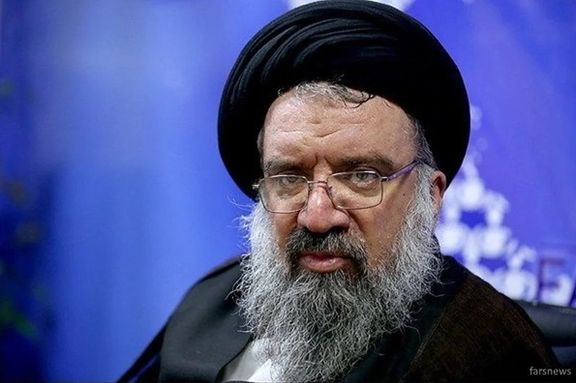
Ahmad Khatami, Friday Prayers Imam in Tehran, has issued a warning to protesters, not to hold demonstrations next month at the anniversary of last Year's protests.

Ahmad Khatami, Friday Prayers Imam in Tehran, has issued a warning to protesters, not to hold demonstrations next month at the anniversary of last Year's protests.
Khatami stated during his Friday sermon, "Throughout these years, enemies have managed to do whatever they could, and even in recent riots, they claimed they came to overthrow, but ended up being overthrown and defeated."
Supreme Leader Ali Khamenei's frequent usage of the term "Enemies" to denote nations like the United States, Israel, and their allies in Europe, underscores the narrative that persists within Iran's leadership.
Khatami's threat intensified as he declared, "If they intend to engage in mischief, they will be punched in the mouth." The interim Friday Prayer Leader of Tehran further reinforced the message, stating, "If they still cling to illusions, they must recognize that they will face destruction and must unequivocally accept this reality."
Meanwhile, Iranian President Ebrahim Raisi recently issued a statement addressing protests against the compulsory hijab, asserting that these actions are being driven by foreign influence. Raisi emphasized a strategic response to quell the demonstrations, prompting speculation of a more robust crackdown on those challenging the hijab policy.
Raisi's assertion regarding the hijab policy is noteworthy considering the persistent defiance of Iranian women and girls against the mandated headscarf. This movement, colloquially known as "the removal of the hijab," has gained momentum despite the state's efforts to suppress it. The upcoming anniversary of the tragic death of Mahsa Amini while in custody of the morality patrol serves as a somber reminder of the ongoing tensions surrounding this issue.
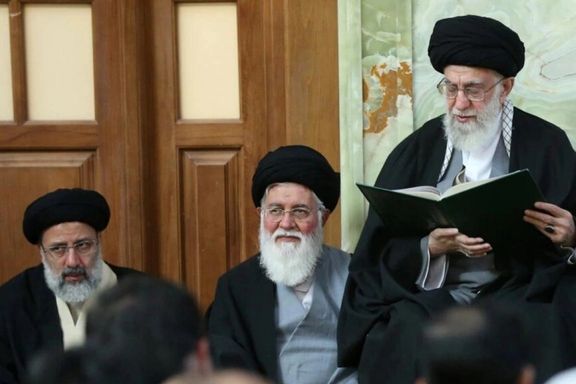
A firebrand senior ayatollah in Iran has called the release of Iran’s frozen funds by the United States “a humiliation” and a “ransom” in exchange for “their spies.”
Ahmad Alamholhoda, who is close to Iran’s ruler Ali Khamenei and is the father-in-law of President Ebrahim Raisi was speaking during his Friday prayer sermon, August 18, in the religious city of Mashhad.
The hardliner ayatollah said that the ransom was paid not because of humanitarian concern for the hostages, but to prevent “their espionage secrets” to be publicized by Iran’s “interrogation” of the prisoners.
“They accepted to return $6 billion of Iran’s money with humiliation, pay ransom and take back their spies,” Alamolhoda said, while mocking “Westernized” Iranians for pinning their hopes on the United States and Europe.
Earlier this month, Iran announced it had reached agreement with the Biden administration to release five dual national American citizens it had arrested and convicted for espionage and related charges in sham trials, n exchange for $6 billion frozen in South Korea due to US sanctions.
The deal has led to sharp criticism and questioning by US lawmakers and many Iranian Americans, who say the Biden administration made a deal in secret and it is not clear what other concessions it has made to the Islamic Republic. Many critics also say that payment of ransom for hostages will endanger the lives of other Americans by emboldening the Iranian regime and other adversaries.
Alamolhoda addressing Iranians whom he called Westernized said, “Are you pinning your hopes on the gates of the West and expect their help? These are impure cowards who for a few spies,” are willing to be humiliated.
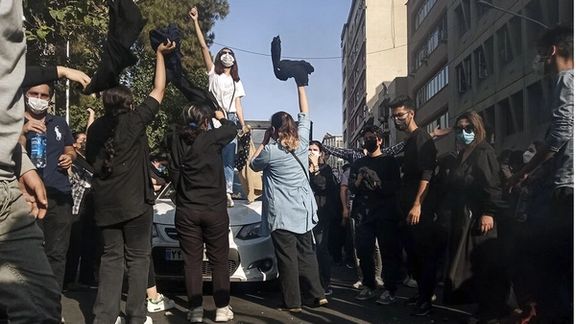
With the anniversary of Women, Life, Liberty protests on horizon, the Islamic Republic regime has intensified its intimidation campaign to discourage potential unrest.
Families of protesters who died during the uprising as well as civil and human rights activists and students are the main target of the regime’s repression apparatus, that wants to silence the most prominent popular voices.
Dozens of the victims’ families and protesters who were detained and released during the nationwide rallies in the past year have been arrested or summoned, with reports coming from several provinces, including Tehran, Gilan, Kordestan, West Azarbaijan, and Esfahan (Isfahan).
On Thursday, security forces detained Kourosh Vaziri, whose 35-year-old wife Shirin Alizadeh was killed by regime agents while she was filming protests alongside her husband and child in Mazandaran province last September. Security agents ordered the family not to mark her birthday this week, which they had to accept, but the agents went for the husband and arrested him anyway.
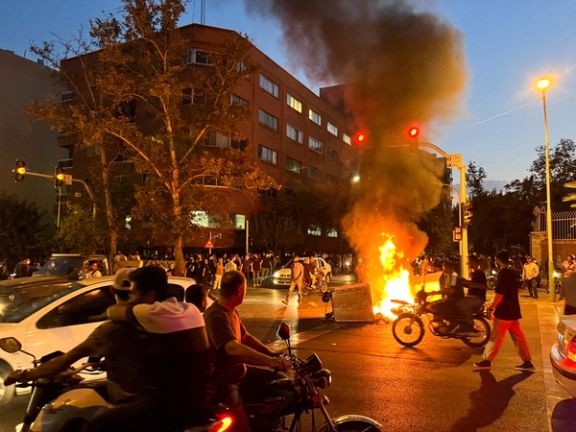
Mahsa Basiratavana, the sister of Mehran Basiratavana – shot dead by security forces in November – was also arrested on Thursday. Mahsa Basiratavana is among a dozen more residents in Gilan province who have been arrested this week, including five women's rights advocates, a photographer, a poet, a graphic designer, and three pharmacists.
On Wednesday, family members of Komar Daroftade -- a 16-year-old boy who was shot from close range in Piranshahr, West Azarbaijan province – were detained and interrogated.
In the capital Tehran, the security forces detained Negar Sardari at her residence and transferred her to an undisclosed location on Wednesday. She is the spouse of Mehdi Etemad-Saeed, a theater actor who was detained several weeks ago.
Elaheh Askari, a photographer and blogger, has also been detained by the Ministry of Intelligence in Tehran. Hamidreza Askari, her brother, wrote on his Instagram page: "On Thursday, after my sister visited the passport office to retrieve her passport, she was detained and transferred to Evin Prison."
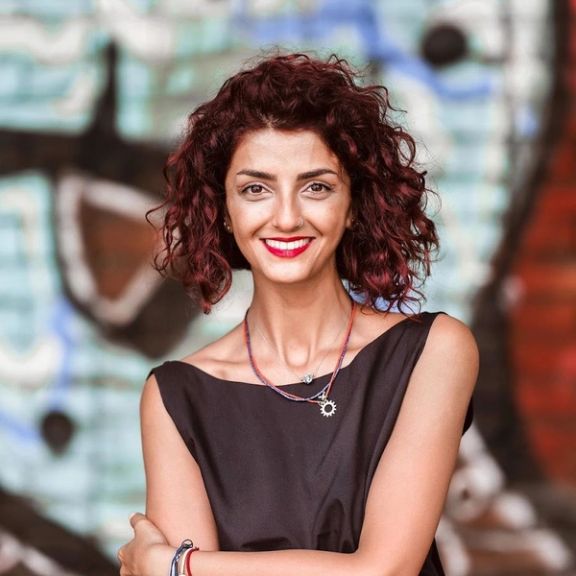
Hengaw Human Rights Organization, a Kurdish rights group, said Thursday that at least 15 people have been arrested in Kurdish majority cities in the past few days. "Government forces, without presenting any judicial warrant, raided the homes of these citizens in Mahabad and Oshnavieh, instilling fear and intimidation, and subsequently arrested them and transferred them to undisclosed locations."
These are only several instances in an escalating string of government clampdowns on activists, students, educators, and writers in the lead-up to the September 16 anniversary of Mahsa Amini’s death at the hands of police.
Over the past several weeks, the intelligence ministry and the Revolutionary Guard (IRGC) intelligence organization (SAS) have been reaching out to individuals who were arrested during the anti-regime protests. They are warning them not to participate in any demonstrations on the anniversary of the protest movement, according to sources in Iran who spoke to Iran International.
Those summoned by the intelligence agencies have been asked to sign pledges to stay at home for a week, and some have even been required to take time off from work, ensuring their absence from any protests. They have been threatened with arrest if they are found engaged in any pro-protest movement activities in public or on social media.
Political analyst Ali-Hossein Ghazizadeh said Friday on X that the Intelligence Ministry’s campaign of arrests and intimidation has been “unprecedented” even for the Islamic Republic. “The problem with these incompetent intelligence agencies is that they fail to understand the nature of society's behavior,” he said, adding, “They fail to grasp that when the roots of discontent have spread to the extent that you are compelled to conduct such massive arrests across the country and from various strata of society, the regime has lost the reins of control.”
He noted that when a society is determined to revolt, security measures can only delay it for so long, predicting that “The people will return to the streets, with even stronger motivations to overthrow this regime. Motivations that the Islamic Republic itself is providing for them.”
On Thursday, Supreme Leader Ali Khamenei held a meeting with a large group of Revolutionary Guard commanders and praised them for their performance, which has resulted in the deaths of 500 civilians, with thousands more injured and tens of thousands arrested. So far, seven protesters have been executed, and several others face execution.
Earlier in the week, hardliner cleric and member of the Iranian Assembly of Experts Ahmad Khatami issued a stern threat against any future protesters, saying that they would be met with forceful suppression, as if the current rounds of suppression are not forceful.
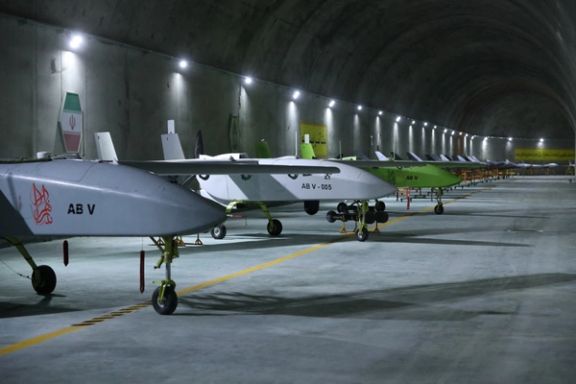
The Washington Post has revealed that Russian drone engineers had to take shelter in a Tehran hotel after an alleged Mossad strike on Iran's drone facility.
The newspaper obtained leaked documents that reveal Russian industrial experts were in Tehran for a joint attack drone operation and were forced to take shelter in their hotel after a reported attack on a Shahed-136 UAV production facility in Esfahan, central Iran.
The Iranian authorities were reportedly concerned about the possibility of additional strikes on drone facilities in Tehran, which the Russian experts were scheduled to visit.
The leaked materials, originating from a source within a specialized Russian facility working on drone production, showcased a project aiming to manufacture 6,000 drones by the summer of 2025.
In June, the US intelligence community revealed that Iran was assisting Russia in establishing a drone manufacturing plant in Russia's Alabuga special economic zone, raising concerns about potential military applications.
While the project encountered delays and difficulties, including staffing shortages in key areas of drone development, experts suggest that Russia is making strides toward enhancing its drone capabilities beyond those of the Shahed-136.
Despite the revelations, neither the Russian government, Iran's UN mission, nor the Alabuga facility responded to requests for comment. The United States and its allies have implemented measures to curtail the transfer of drone-related components to Russia and Iran.
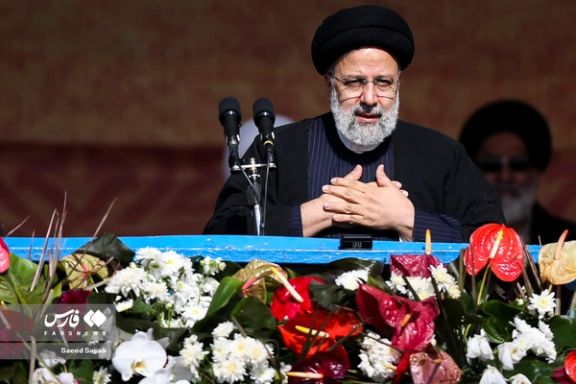
Iranian President Ebrahim Raisi has said that people of all faiths, Shias, Sunnis, and even non-Muslims regard the Revolutionary guard as a protector.
The president's remarks follow Iran's Supreme Leader Ali Khamenei comments this week describing the Revolutionary Guard as “the largest counter-terrorist organization in the world” and a forceful military power.
Raisi praised the IRGC and claimed its role has been “a source of security, tranquillity, and hope across various domains.” He went on to assert that the presence and actions of the “dedicated fighters have prevented the spread of ISIS influence in Europe” and criticized what he described as “labeling the Revolutionary Guard.”
Earlier this year, the European Parliament adopted a resolution urging member states to classify the IRGC as a terrorist organization. This development followed a movement initiated by Iranian and European activists and politicians, who have implored European states to designate the IRGC as a terror group. The movement gained traction due to the IRGC's involvement in widespread repression following the death of Mahsa Amini. However, the European Union claimed it cannot list Iran's IRGC as a terrorist entity until an EU court has determined that they are.
The IRGC has faced numerous accusations of supporting, training, funding, and arming various non-state entities and proxy groups throughout the Middle East. Organizations such as Hezbollah in Lebanon, Hamas in Palestine, Houthis in Yemen, and Shiite militias in Iraq and Syria have been recipients of IRGC support. Some countries have designated these groups as terrorist organizations due to their involvement in armed conflicts.
In recent years, the IRGC has also faced allegations of engaging in cyber activities, including cyber espionage, hacking, and disruptions targeting both regional and international entities.
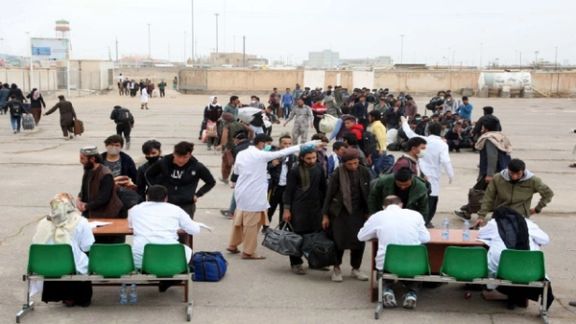
The former chairman of Iranian parliament's national security and foreign policy committee says one in every five Afghans now lives in Iran.
Heshmatollah Falahatpisheh told Faraz Daily website that "every day some 10,000 Afghans arrive in Iran as illegal immigrants and surprisingly, they get a job and a place to live within two days." He said it is as if there is a well-organized system that arranges this influx.
The former lawmaker added that based on a 2016 statistics, 1.5 million of the 7.5 to 8 million Afghans living in Iran have a military background. Seven years later, the figure must have increased considerably.
According to Khabar Online, the Afghans have been fleeing from war, violence, natural catastrophes and violations of human rights under the Taliban rule. Many of them go to Iran, and some to Iraq and Syria to escape the calamities. People also see no economic future and no social freedoms under Taliban rule.
The website added that according to the Iranian Immigration Monitoring Agency, currently, 65 percent of all migrants in the world come from Afghanistan. Nicaragua and Syria, followed by Venezuela and Haiti. In 2022, Venezuela was on top of the list.
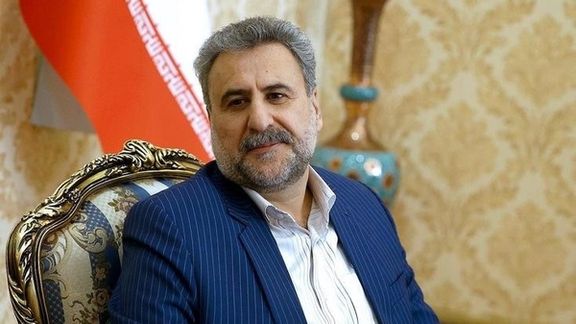
Khabar Online quoted a UN official as saying that between 500,000 to 1.5 million Afghans have arrived in Iran after the Taliban takeover of Afghanistan. In July, Interior Minister Ahmad Vahidi put the number of Afghan refugees in Iran at over five million.
In an unattributed commentary in July, Aftab News in Tehran said millions of Afghan immigrants consume at least $5b of around $90 to 100 billion annual subsidies that the government is spending to keep fuel, other energy and food prices down. The website suggested that this is only one of the ways in which the authorities are encouraging Afghans to stay in Iran.
The article suggested that the Islamic Republic might be facilitating Afghan immigration as a remedy to the problem of population decline. “We should not start to import a big population that lacks national and religious [conformity with the Iranian population] under the pretext that the country’s population may decline within the next few decades,” it said.
Falahatpisheh told Khabar Online that lack of accurate statistics about Afghans in Iran deprives hundreds of thousands from educational and health services in the host country. Furthermore, their presence has faced Iran with a major challenge as their movement cannot be monitored in terms of security, economic and social issues.
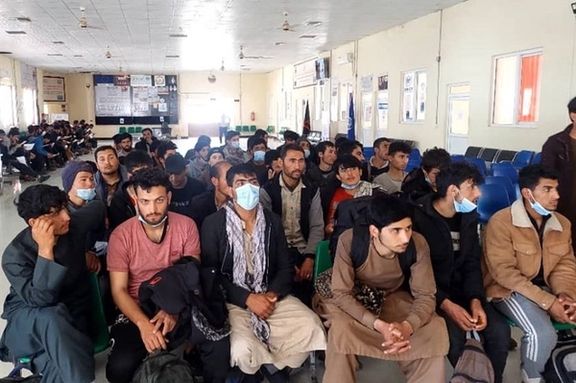
He further criticized the Iranian government for failing to keep tabs on Afghan refugees. He said: "A major part of those who come to Iran from Afghanistan have military background. We are facing an entity called the Taliban which knows nothing other than war and can turn the smallest issues into a war. Any issue in Iran-Afghan relations such as the ongoing border dispute provokes part of the Afghans in Iran.” Nonetheless, Khabar Online quoted Interior Minister Ahmad Vahidi as saying that Iran's security agencies monitor the Afghan refugees and make sure they do not pose a challenge to Iran.
Falahatpisheh further added than Afghans arrive in Iran like a wave and change the population milieu in some Iranian cities. While most Iranian families have only one child, most Afghan families have at least three children. After a decade, Afghans may comprise the majority of the population in those cities.
He added that Afghans arrive in Iran although they are aware of the shortcomings in the host country. Some of them are skilled workers and technicians and simply look for security and peace of mind in Iran.
Falahatpisheh said the number of Afghan refugees in Iran has been constantly on the rise, but Interior Ministry officials play with statistics to conceal their incapability to draw a proper plan to handle the issue.
Nonetheless, the former lawmaker insisted that the Iranian government should continue welcoming Afghan refugees. He said they have contributed to Iran's reconstruction after the 1980s Iran-Iraq war by doing the hardest jobs Iranian workers tend not to take.